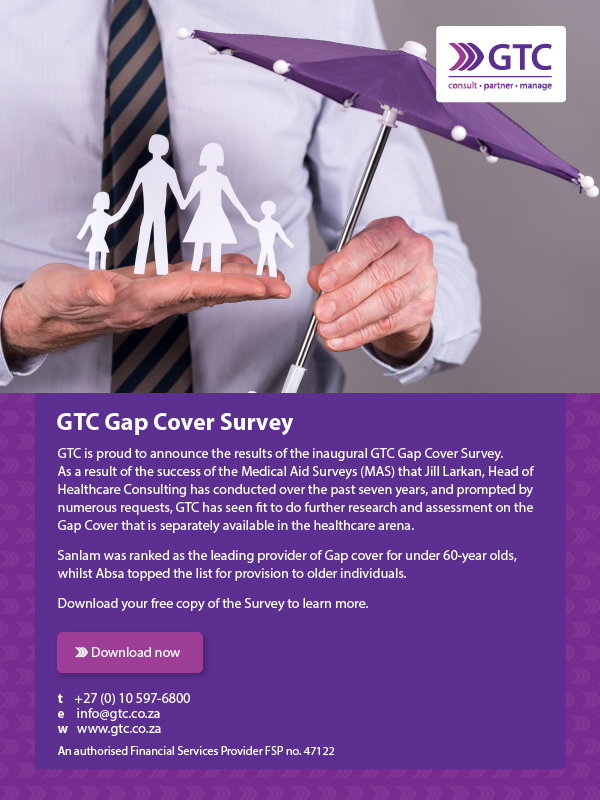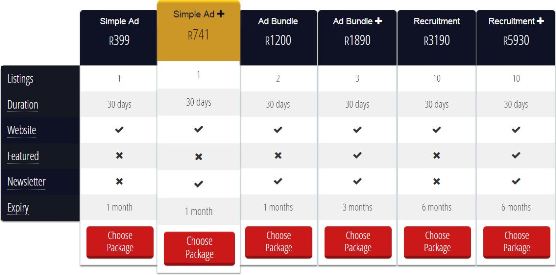|
To Subscribe please click
here |
 |
|
Investment Indicators - 25 June 2018 |
|
|
|
Many of life's failures are people who did not realize how close they were
to success when they gave up - Thomas A Edison |
| |
|
|
Distributed to 52,280 subscribers.
To advertise with us
click here |
|
| |
 |
| Rates Review |
 |
|
1. Secured Investment Rates |
|
Please note that (G) indicates a Guaranteed and (L) a Linked product. In order to understand the difference between guaranteed and linked rates,
kindly click here for an explanation. |
|
|
|
|
|
 |
|
|
|
| |
Company |
This Week |
Last Week |
| 1 |
Clientéle Life (L) |
7.170% |
7.270% |
|
2 |
1Life (L) |
7.110% |
7.370% |
|
3 |
Absa (L) |
6.997% |
7.186% |
 |
|
|
|
|
|
|
|
|
 |
|
|
|
| |
Company |
This Week |
Last Week |
| 1 |
Discovery (G) |
7.496% |
7.527% |
|
2 |
Clientéle Life (L) |
7.270% |
7.370% |
|
3 |
Assupol (G) |
7.180% |
7.280% |
 |
|
|
|
|
|
2. Money Market Funds |
|
|
|
Please bear in mind that our figures, though based on the actual quotations that you also use, are for information purposes only,
and can never replace the official quotation from the product house. In terms of the guarantees, you are requested
to clarify the exact extent of such guarantees with the product house prior to advising clients. |
|
|
|
|
|
 |
|
From the Crow's Nest |
 |
|
Medical Schemes Amendment Bill |
The honourable Minister of Health, Dr Aaron Motsoaledi, revealed the
following proposals contained in the Bill during a media briefing on
21 June 2018.
-
End of co-payments
-
Abolishment of brokers
-
Abolishment of Prescribed Minimum Benefits
-
Addresses unequal benefit options
-
Fake medical schemes to be outlawed
-
Creation of a central beneficiary registry
-
Income cross-subsidisation model
-
Medical Aids must ‘pass back’ savings
-
Cancellation of membership
-
Governance of medical aid schemes
Below is a direct extract from the Minister’s media briefing document on
the first three which will impact most on our subscribers.
Co-payment abolition
The first amendment is to abolish what has come to be known as
co-payments. Co-payments mean that the scheme pays a portion of the
bill that a provider (Hospital or Private doctor) charges to a
patient. The rest of the money is supposed to be paid by patients
from their own pocket.
The amendment means that every cent charged to the patient must be
settled fully by the scheme and the patient should not be burdened
with having to pay.
There are people who will scream that this amendment is outrageous
and calculated to destroy medical schemes and leave beneficiaries
with nothing.
I wish to assure you that this was well thought of. The load of
complaints received from the public by us in the Department of
health as well as by the Council for Medical Schemes (CMS), i.e the
medical schemes regulator, justifies this amendment.
Furthermore, the data at our disposal shows that medical schemes are
holding reserves of close to R60 billion that are not being used.
Granted, there is a statutory requirement that medical schemes
should have 25% of their income in reserve. This is to cater for
emergencies. But presently the R60 billion is equivalent to 33%
reserves, which means unnecessary accumulation at the expense of
patients.
These huge reserves were accumulated partly through high premiums
but also by introducing the co-payments such that medical schemes
avoid having to pay or even dip into the reserves if the situation
demands.
Furthermore the Council for Medical Schemes (CMS) is busy reviewing
this statutory requirement of 25% with a view to releasing enough
money for patients rather than holding a lot of reserves while
patients suffer the hardships.
Brokers Abolished
The second amendment is to abolish the practice of using brokers
within the medical scheme environment. Almost two thirds of
principal members of medical aid schemes pay monthly to a broker as
part of their premium. Many of these members do not even know that
they are paying this money which in 2018 is R90.00 per month.
The total amount paid to brokers in 2017 was R2.2 billion.
We want this money to be made available to pay for direct health
expenses of members rather than serving brokers who are actually not
needed in the healthcare system.
We are aware that most of the work supposedly done by brokers is
actually done by the Council for Medical Schemes - the statutory
body.
Abolishment of PMBs
The third amendment is to abolish the practice of Prescribed Minimum
Benefits (PMBs) and replace it with comprehensive service benefits.
Prescribed Minimum Benefits were mostly hospital-based conditions.
Comprehensive service benefits will include Primary Health Care (PHC)
like family planning, vaccination, screening and wellness services.
Comment
We fully endorse the goals which the proposed amendments hope to
achieve. In fact, it is taking far too long, and the suggested
quick-fixes do not address the most urgent needs.
The World Health Organisation statistics show that South Africa, at
42.2% has the highest voluntary health insurance spend in the world.
One has to wonder whether the honourable Minister realises that this
is a direct result of the terrible state that public healthcare is
in.
South Africa’s enormous security industry is also a direct result of
the failure by the state to perform its statutory duty towards its
citizens. Ditto education.
The same focus and efforts currently underway to reconstruct and
repair state owned enterprises should be employed to restore
healthcare, security and education to a level where its benefits the
ordinary people of South Africa, and not the fat cats and patronage
appointments with their snouts in the self- enrichment troughs. It
starts with proper management and the appointment of properly skilled people.
As regards his views on the role of healthcare advisers, I can at
best suggest that he must have been misinformed (or should that read
disinformed?). After 40 years in the financial services industry I
am unable to grasp the intricacies of options offered by ONE scheme,
never mind everything that is on offer. I make use of the
professional knowledge of my broker, and am very happy to pay a
retainer for the use of his services during the year, should the
need arise. To suggest that a financial adviser is not a
professional flies in the face of exactly what FAIS and all
subsequent legislation sets out to achieve – the professionalisation
of the industry.
Click here to read the official text of the press conference by
the Minister.
Click here to view the accompanying Powerpoint presentation. |
|
|
|
|
|
 |
| Your Practice Made Perfect |
 |
|
Fit and proper requirements - Important deadlines |
It is important to note that FSPs with financial year end at February
need to submit their financial statements to the FSCA by 30 June 2018.
Any FSP that was authorised for Collective Investment Schemes and/or
Long-term or Short-term Deposits on 1 April 2018, and wishes to add CIS
Hedge Funds and/or Structured Deposits to their licence, must submit
their applications to the FSCA by 30 June 2018. If you need any
assistance, please contact your Compliance Officer. |
|
|
|
|
|
 |
| |
|
Extension of implementation of Replacement Regulations on life risk
policies |
The Financial Sector Conduct Authority provided long-term insurers with
an extended period of time to comply with Rule 19 of the PPRs and
Regulation 3.9A of the Regulations until 1 January 2019.
Click here to read the FSCA communication.
About Rule 19 of the PPRs and Regulation 3.9A of the Regulations
Rule 19 of the PPRs provides that insurers must obtain confirmation from
intermediaries whether a policy to be entered into constitutes a
replacement policy. If it does, the insurer must obtain a copy of the
record of advice that the intermediary is required to give you in
accordance with the code of conduct under the Financial Advisory and
Intermediary Services (FAIS) Act, unless the intermediary confirms that
he or she did not provide advice. Then, the receiving insurer must
provide the insurer of the replaced policy with a copy of the advice
record.
In addition, the insurer must confirm that the replacement advice record
complied with the FAIS code of conduct and contained information
indicating that the intermediary took reasonable steps to satisfy
himself or herself that the replacement policy was more suitable to your
needs than retaining or modifying the replaced policy.
Regulation 3.9A of the Regulations state that an insurer may not pay any
commission in respect of a replacement risk policy unless and until the
confirmation referred to in PPR 19 has been provided. |
|
|
|
| |
|
Are you ready for loadshedding? SANTAM gives advice
|
Eskom recently announced that rotational load shedding will be on-going
for the next ten days due to the power grid needing to stabilise
following strike action. In light of this, Santam has identified the big
risks for businesses and households according to a survey it conducted
during 2015’s lengthy load shedding period.
Marius Neethling, Personal Lines Underwriting Manager at Santam also
urges households to take extra precautions to manage their risk and
protect against losses resulting from load shedding.
Click here to read the
SANTAM media release. |
|
|
|
| |
 |
| |
|
Professional Principal Executive Officer Qualification
|
Registrations for the second intake starts of the Professional
Principal Executive Officer Qualification commenced last week. The
course will commence on 30 July 2018. Registration will close on 15 July 2018.
Who should register?
-
Current Principal Officers, trustees and retirement fund
functionaries.
-
People working in a claims or employee benefits and compensation
environment who have access to a retirement fund.
Successful learners will be linked to the professional designations
offered by Batseta, the professional body for the profession. The
learning pathway will include the Retirement Fund Trustee
qualification.
Registration
You are welcome to contact Frans-Petrus Zeelie at 087 702 6429, or email
frans@mbse.ac.za, who will gladly assist with any questions.
To register, click
here, then on
Enrol today, select Qualifications and
finally click on the Professional Principal Executive Officer button.
For more information, please
click here.
For general queries you may also email us at
learning@mbse.ac.za.
|
|
|
|
|
Regulatory Examinations |
 |
|
How to prepare for the REs |
|
The FSCA strongly recommends the use of its
Preparation Guide to prepare for the exams.
The FSCA Preparation Guide suggests the following approach
|
STEP |
ACTIVITY |
DESCRIPTION |
|
1 |
Refer to the
mapping document for the exam you are planning
to write. |
This is the map of
the tasks/criteria that will be assessed in your
exam, and it contains a reference to the
relevant legislation that you are required to
study in order to understand the task /
criteria. Appendix A in the Preparation Guide |
|
2 |
Look at the number
of criteria for each task. |
These are the
knowledge and skill components you require to be
able to perform.
RE 1 has 16 tasks that will be tested
RE 5 has 8 tasks that will be tested
If you have studied all the criteria for every
task, then you would be properly prepared to
write the RE 1 or RE 5 – whichever exam applies to
you. |
|
3 |
To prepare for the
exam, you must spend time each day and study the
legislation and supporting training material.
One should systematically select one criteria at
a time. |
Group the criteria
together in groups of 3 or 4 and allocate study
hours per day to prepare. The total number of
hours will individually differ due to ones
circumstances. At least 2 hours per day is the
suggested number of hours. |
|
4 |
To start, read the
task, and then the first criteria. Then refer to
the legislation for these criteria, and read the
legislation referred to. |
It is important to
first read the legislation so that you can see
what terms are used and how the legislation is
structured. |
|
5 |
Now refer to the
additional support or training material and study
the section in the training material dealing
with those particular criteria. |
The support
material explains the particular concepts in
simple language so that it is easier to
understand what the legislation is actually
saying and what it means. |
|
6 |
Then go back to the
legislation itself, and read it again.
Where there are discrepancies, ALWAYS regard the
legislation as being correct. |
Now that you have
gained a better understanding of what the
legislation is about, you may find reading the
legislation again will make more sense to you if
you didn’t understand it the first time around. |
An alternative that you may want to consider is the
LexisNexis Legislation Handbook for RE 1 (key individual)
and RE 5 (representative) exams.
The 5th edition of the Handbook has just been
released and provides the latest legislation specified as
relevant to the regulatory exams RE 1 and 5.
The Handbook has been divided into 5 sections with shaded
tabs on the side for easy access:
-
TAB A: FAIS Act and Regulations
-
TAB B: Code of Conduct
-
TAB C: Fit and Proper
-
TAB D: General Acts, Board Notices and Guidance Notes
-
TAB E: FIC Act, Regulations and Guidance Notes
The Handbook together with its Preparation Guides provides a
good source to study for the exams. Click here to download
the LexisNexis Preparation Guide for
RE 1 and
RE 5.
The LexisNexis Legislation Handbook has now been updated with all
the new legislation effective from 1 April 2018.
Click here to order your copy from our Advisor Store. |
|
|
|
| |
|
2018 Schedules updated |
Please note: Registration cut-off is 11 working days before date of exam.
|
|
|
|
|
Careers Platform
|
|
Are you hiring? Advertise your position on Moonstone’s Career Platform
|

| • |
The Moonstone website -
www.moonstone.co.za
- enjoys an average of 20 000 visits and approximately 39 000 page views per month. |
| • |
Moonstone boasts an exclusive newsletter mailing list of over 52000
dedicated financial decision makers who receive 2 newsletters per week. |
| • |
Our audience is relevant and industry specific: individual and corporate advisors and brokers in the following financial sectors:
iInvestment, Risk, Healthcare, Banking, Retirement, and Insurance. |
|
|
|
|
|
In Lighter Wyn |
 |
|
|
|

Tel: +27 21 883 8000 | Fax: +27 21 883 8005
info@moonstoneinfo.com
www.moonstone.co.za
P.O. Box 12662, Die Boord, Stellenbosch, 7613, Republic of South Africa
Disclaimer:
Services and products advertised by external product suppliers in
this newsletter are paid for by the respective suppliers. Moonstone
does not endorse any opinions, conclusions, data, products, services
or other information contained in this e-mail which is unrelated to
the official business of Moonstone and furthermore accepts no
liability in respect of the unauthorised use of its e-mail facility
or the sending of e-mail communications for other than strictly
business purposes.
The complete disclaimer can be accessed
here. |
|
|
©2015 Moonstone. All rights reserved. |
| |






















